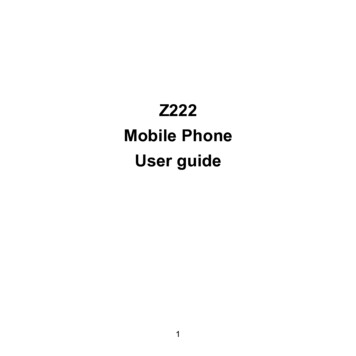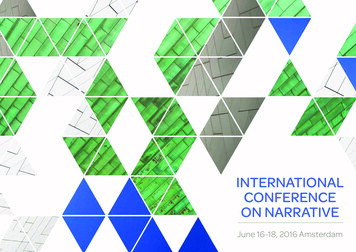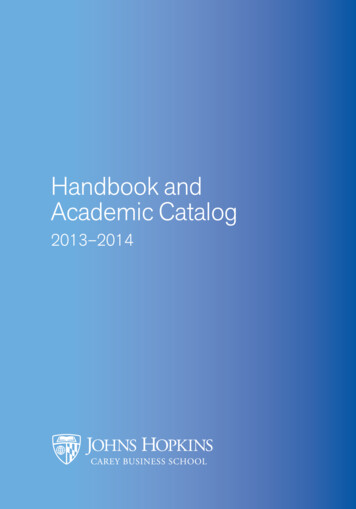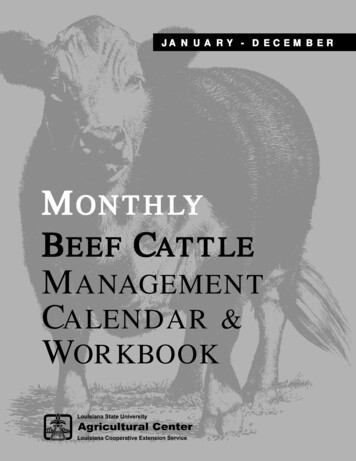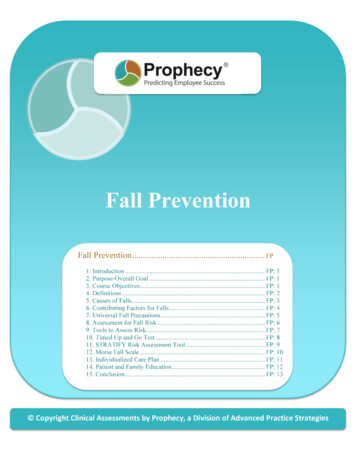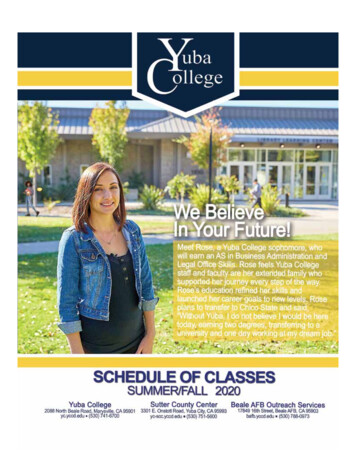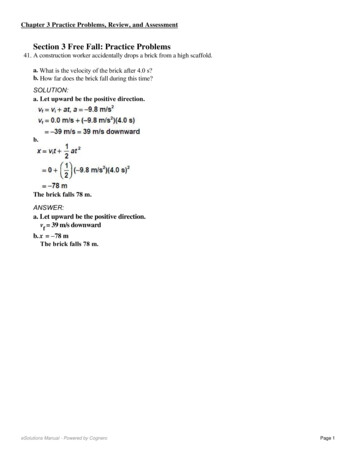
Transcription
UNIVERSITYofCALIFORNIAPRESSFALL2020IN TERNATIONAL EDITION
FALL 20201TRADE / ACADEMIC TRADE22HIGHLIGHTS38ART46NEW IN PAPERBACK54SOCIAL SCIENCES62HISTORY65FILM & MEDIA STUDIES67MUSIC67LANGUAGE KLIST HIGHLIGHTS77SALES INFO79INDEX OF AUTHORS ANDTITLESSUPPORT THEUC PRESSFOUNDATIONwww.ucpress.edu/supportusDear Readers,Welcome to the University of California Press Fall 2020catalog. During this year of unprecedented events I know weall have a lot on our minds. I hope that this season’s offeringscan both deepen our understanding of what’s happening andalso provide a little respite.For a deeper understanding, consider Juliet B. Schor’s Afterthe Gig, Neve Gordon and Nicola Perugini’s Human Shields,and Robert C. Bartlett’s Against Demagogues—three titlesthat are disturbingly relevant to the world we now live in.Schor examines the lost promise of the gig economy andhow to get it back; Gordeon and Perugini explore the historyof using human beings as a defense during war; and Bartlettpresents a new translation of Aristophanes’ ancient Greekplays that addresses one of the most disturbing politicaltrends today.We also go farther into the past with The Koreas—a deephistory that interrogates the assumptions we make aboutour present moment. And in Serving a Wired World, KatieHindmarch-Watson explores the fascinating history of howthe world’s first Internet—the Victorian telegraph system—was built on gendered labor.But what to do when you’re hungry for information andknowledge that’s not quite so relevant to political events?Step one: Read The Goode Guide to Wine, by Jamie Goode.Even if you disagree with him, you can sip and argue. Steptwo: Read Marion Nestle’s engaging and deeply expert takeon what you should eat and why. You’ll never look at yourrefrigerator or grocery store shelf the same way again.Once your more base needs are satisfied, you can dig intoJan Caeyers new biography of Beethoven—a remarkablereimagining of one of the greatest composers of all time.Follow UC PressBlog www.ucpress.edu/blogTimFacebook facebook.com/ucpressTwitter @ucpressInstagram @uc pressLinkedIn sSullivan, Executive Director
The Goode Guide to WineA Manifesto of SortsJamie GoodeWho will have the last word on wine, if not Jamie Goode? Over the last decade,Goode has embarked on almost nonstop travel through the world’s vineyards inan effort to understand the beautifully diverse and complicated world of wine. Hishard-nosed pursuit of the most interesting stories to tell about wine has led ushere, to The Goode Guide to Wine. This book—a sort of manifesto—distills many ofthe observations, lessons, and opinions that have made Jamie Goode a renownedvoice within the wine world.In a series of short, pithy, and often rather blunt chapters, he celebrates what isexciting and interesting about wine, asks how we could do things better, and pointsout some of the absurdities of wine culture. Jamie Goode has a distinct philosophywhen it comes to wine, and he knows you may disagree; if you do, that means it’sworking. The Goode Guide to Wine is a book designed to provoke and inspire inequal measure, encouraging the reader to be critical and to see the world of winethrough fresh eyes.Praise for Flawless: Understanding Faults in Wine“Mr. Goode is succinct and clear about how . . . various flaws are expressed inwines. This can be helpful to any wine lover who knows when a wine is not right,but doesn’t know exactly what is wrong.”—New York Times“Should be on the bookshelf of all ambitious and passionately curious wineprofessionals.”—Sam Harrop MW, winemaker and coauthor of Authentic Wine: Toward Naturaland Sustainable WinemakingThis pocket guide to Jamie Goode’sphilosophy at once celebrates andcritiques the world of wine.Praise for I Taste Red: The Science of Tasting Wine“Our five favorite liquor and wine books from 2016: An engaging read.”—San Francisco 2 pp. 4 x 6WORLD“The book is superb. . . . Should be read by every individual who tastes winecritically, produces wine, or simply enjoys wine’s pleasures.”—CHOICE 18.95T 15.99 Cloth978-0-520-34246-0Jamie Goode is a wine writer and lecturer. He hasa national newspaper column, writes for manypublications, and authors wineanorak.com, one of thetop wine websites. His previous books include TheScience of Wine, Flawless, and I Taste Red. He is basedin London, UK.ALSO BY JAMIE GOODE978-0-520-27690-1 24.95sc 21.00Clothwww.ucpress.edu978-0-520-29224-6 29.95T 25.00Cloth978-0-520-27689-5 39.95scClothTRADE / ACADEMIC TRADE 1
Beethoven, A LifeJan Caeyers. Translated by Brent AnnableThis new biography of Ludwig van Beethoven offers connoisseurs and newcomersalike an unparalleled story of the composer’s life and works, written by a renownedconductor and scholar of Beethoven’s music. With unprecedented access to thearchives at the Beethoven House in Bonn, Jan Caeyers expertly weaves togethera deeply human and complex picture of Beethoven—his troubled youth, hisunpredictable mood swings, his desires, relationships, and conflicts with familyand friends, the mysteries surrounding his affair with the “immortal beloved,” andthe dramatic tale of his deafness. Caeyers also offers new insights into Beethoven’smusic, showing how it transformed from the work of a skilled craftsman to that ofa consummate artist.Demonstrating an impressive command of the vast scholarship on this iconiccomposer, Caeyers brings Beethoven’s world alive with elegant prose, memorablemusical descriptions, and a vivid depiction of Bonn and Vienna, where Beethovenproduced and performed his works. Caeyers explores how Beethoven’s careerwas impacted by the historical and philosophical shifts taking place in the musicworld and how, in turn, his trajectory changed the music industry. Equal partsan absorbing cultural history and a lively biography, Beethoven, A Life reveals acomplex portrait of the musical genius that defined a style of music and went onto become one of the great pillars of Western art music.“The biography of a musician, written by a musician, becomes music itself.It literally begins to resonate. And it is enjoyable and moving to listen to—asinformative as it is entertaining.”—Gerhard Stadelmaier, Frankfurter Allgemeine ZeitungIn this first translation into English,a celebrated musician and scholarpresents the composer’s life as a pivotalmoment in music history for the 2020Sestercentennial of Beethoven’s birth.SEPTEMBERBiography & Autobiography/Entertainment & Performing Arts680 pp. 6 x 9 53 gathered b/w illustrations, 24 musicexamplesWORLD“An extremely readable study, composed in the present for the present.”—Kai Luehrs-Kaiser, Die Welt“Jan Caeyers has written a major book on Beethoven. . . . He achieves a vibrantportrait of the composer, his contemporaries, and society in provincial Bonn andthe metropolis of Vienna.”—Tobias Schwartz, Märkische Allgemeine“Caeyers has achieved a comprehensive biography that also captivates emotionallywith detailed facts.”—OperapointJan Caeyers is a conductor and musicologist. Themusic director of the Beethoven orchestra Le ConcertOlympique and a member of the Department ofMusicology at KU Leuven, Caeyers is one of Europe’spreeminent experts on Beethoven.ALSO OF INTEREST978-0-520-35079-3 24.95T 21.00Paper (see p. 35)978-0-520-28315-2 29.95sc 25.00Paper978-0-520-30349-2 29.95sc 25.00Cloth2 TRADE / ACADEMIC TRADEUniversity of California Pressphoto by Marco Borggreve 34.95T 29.00 Cloth978-0-520-34354-2
An INTERVIEW withJan CaeyersAs a conductor of Beethoven’s music, what draws you to this composer’s life and works?Beethoven’s music fascinates like no other, as it stimulates in equal measure both the head and the heart—facets in musicthat are often diametrically opposed. Not only did Beethoven push the musical language of his day to its limits, but he alsoconceived of an entirely new musical grammar. One significant consequence of his works was the introduction of the conceptof “innovation” as a key parameter in the evaluation of new music.A noteworthy aspect of Beethoven’s oeuvre is that it covers every genre of the time, ranging from major vocal, orchestral,and chamber works to the smallest occasional pieces. Each one bears his unique compositional signature and hallmark ofquality—none of his works drops below a certain critical quality threshold. And in contrast to the great, tormented, andmajestic works (da-da-da-DAAAA) that are part of the mythical image of Beethoven cultivated in the nineteenth century,there exists a broad spectrum of compositions characterized by tenderness, lyricism, pathos, and even wit. These elementsare reflected in Beethoven’s own personality; especially in his youth, he was often described as an amiable, charming, andsportive young man.In what ways was Beethoven a product of his time? And why do you think his works havewithstood the test of time?Beethoven lived at a critical period in history, during the transition from the old feudal system to the rise of the middleclasses. Not only did he express the changing Zeitgeist in his music, but he also redefined the profession of “composer” inboth a practical and psychological sense. He saw the shifts in society and turned them expertly to his advantage, capitalizingcreatively on emerging patterns in musical life and consumption.At the same time, Beethoven’s music is timeless. It is based on universal and unchanging laws of beauty, which means thateven when its high degree of unpredictability sends it to emotional extremes, the listener needs not fear a loss of overallcohesion.What musical piece best represents the dynamism, complexity, and enormity of the composer’spersona?I believe that Beethoven’s greatest achievement is the Missa solemnis, which he worked on for nearly four years (with a fewinterruptions). This period was preceded by nearly ten years of preparatory study, which allowed Beethoven—who had barelyeven attended school—to draw from a well-filled autodidactic wellspring of musical, literary, iconographic, theological,and liturgical knowledge. Thanks to his sixth sense for musical proportion and structure, which he continued to refine anddevelop throughout his life, he was able to incorporate this broad spectrum of expertise into a single homogenous workwithout permitting rhetorical detail to produce compositional tunnel vision. The Missa solemnis can also be regarded asBeethoven’s ideological and spiritual testament: a message to humankind that transcends the realm of music and is ascurrent today as ever.In this year’s 250th celebration of Beethoven’s birth, what should readers take away fromyour book about his life and career?Any biography of Beethoven is in fact a portrait of the universal artist, and demonstrates that the most fascinating careersare never straightforward. Granted, the young Beethoven was incredibly talented, but his genius was the result of thedetermination and imagination with which he responded to the obstacles in his path. In this sense, he is the prototypicalmodern citizen who, regardless of background or origin, can take control of their life in order to achieve greatness.Beethoven also left an important legacy that can be interpreted as a spiritual missive: the notion that striving for excellencein Beauty is what enables humankind to rise above the brutal and materialistic nature of reality, and in so doing, to giveindividual meaning to existence. In this sense, engaging with Beethoven—both his life and his music—is a source ofinspiration to us all.www.ucpress.eduTRADE / ACADEMIC TRADE 3
Human ShieldsA History of People in the Line of FireNeve Gordon and Nicola PeruginiFrom Syrian civilians locked in iron cages to veterans joining peaceful indigenouswater protectors at the Standing Rock Sioux Reservation, from Sri Lanka to Iraqand from Yemen to the United States, human beings have been used as shieldsfor protection, coercion, or deterrence. Over the past decade, human shieldshave also appeared with increasing frequency in noncombat contexts such asantinuclear struggles, civil and environmental protests, and even computer games.The phenomenon, however, is by no means a new one.In Human Shields, Neve Gordon and Nicola Perugini describe how humanshields have been used in key historical and contemporary moments and acrossgeographical sites. The practice of human shielding corresponds with the historyof shifting understandings of what is valued as “human”: in the American CivilWar and the Franco-German War, only the elite were used as shields, while in laterconflicts, hundreds of thousands of women and children and indigenous people ofcolor were placed in the crossfire as deterrents.Human Shields demonstrates how this increasing weaponization of human beingshas made the position of civilians trapped in theaters of violence more precariousand their lives more expendable.“With its insights into the politics of who counts as human, this book is one of themost important interventions ever in the critical history of the laws of war.”—Samuel Moyn, author of Not Enough: Human Rights in an Unequal World“Compellingly important and thoroughly absorbing, this very readable book willfast become the standard reference in our understanding of human shields.”—Laleh Khalili, author of Sinews of War and Trade: Shipping and Capitalism inthe Arabian PeninsulaNeve Gordon is Professor of Human Rights andInternational Law at Queen Mary University of London.He is the author of Israel’s Occupation and coauthor ofThe Human Right to Dominate.SEPTEMBERHistory/World296 pp. 6 x 9 36 b/w illustrationsWORLDNicola Perugini is Senior Lecturer in InternationalRelations at the University of Edinburgh. He is thecoauthor of The Human Right to Dominate.photo by Farah Saleh 29.95T 25.00 Cloth978-0-520-30184-9ALSO OF INTEREST978-0-520-29571-1 34.95T 29.00Cloth978-0-520-35564-4 24.95T 21.00Paperphoto by Haim BresheethThe chilling history of human shields andthe deeper question of what “human”means.978-0-520-27781-6 39.95tx 33.00Paper4 TRADE / ACADEMIC TRADEUniversity of California Press
Against DemagoguesWhat Aristophanes Can Teach Us aboutthe Perils of Populism and the Fate ofDemocracyRobert C. BartlettAgainst Demagogues presents Robert C. Bartlett’s new translations ofAristophanes’ most overtly political works, Acharnians and Knights. In thesefantastically inventive, raucous, and raunchy comedies, the powerful politicianCleon proves to be democracy’s greatest opponent. With unrivalled power,both plays make clear the dangers to which democracies are prone, especiallythe threats posed by external warfare, internal division, and class polarization.Combatting the seductive allure of demagogues and the damage they cause,Against Demagogues disentangles Aristophanes’ serious teachings from hismany jokes and pratfalls, substantiating for modern readers his famous claim to“teach justice” while “making a comedy” of the city.The book features an interpretive essay for each play, expertly guiding readersthrough the most important plot points, explaining the significance of variouscharacters, and shedding light on the meaning of the plays’ often madcapepisodes. Along with a contextualizing introduction, the book offers extensivenotes explaining the many political, literary, and religious references andallusions. Aristophanes’ comedic skewering of the demagogue and his ruthlessambition—and of a community so ill-informed about the doings of its owngovernment, so ready to believe in empty promises and idle flattery—cannot butresonate strongly with readers today around the world.“Bartlett brings his extraordinary skill as a translator to these two Aristophaniccomedies. The notes and penetrating interpretive essays provide invaluableguidance for anyone who wishes to understand the serious answers thatAristophanes offers to enduring questions of human life. A must-have volume forstudents of literature, of the classics, or of political thought.”—Timothy Burns, Professor of Political Philosophy, Baylor UniversityTimeless comedies on resisting tyrannyfrom one of history’s greatestcomic playwrights.OCTOBER“In this surprisingly timely volume, Robert Bartlett shows that Aristophanes’comedies can deepen our understanding of the hazards of democracy. With asharp ear for Aristophanes’ humor and a keen eye for his wisdom, Bartlett opensup the delights and the insights of the ancient comic sage.”—Devin Stauffer, Professor of Government, The University of Texas at AustinPolitical Science/History & Theory279 pp. 5 1/2 x 8 1/4WORLD 19.95T 16.99 Cloth978-0-520-34410-5Robert C. Bartlett is the Behrakis Professor in HellenicPolitical Studies at Boston College and has authorednumerous studies on the history of political thought,including recent editions of Aristotle’s NicomacheanEthics (with Susan Collins) and the Art of Rhetoric.ALSO OF INTEREST978-0-520-29297-0 29.95tx 25.00Paperwww.ucpress.edu978-0-520-28758-7 18.95T 15.99Paper978-0-520-28759-4 24.95T 21.00PaperTRADE / ACADEMIC TRADE 5
World Literature in TranslationThe AnalectsThe Mwindo Epic from theBanyangaConclusions and Conversations ofConfuciusTranslated by Moss RobertsEdited and translated by Daniel Biebuyck andKahombo C. MateeneFor anyone interested in China—its past, its present, and its future—theAnalects (Lunyu) is a must-read. This new translation by renownedEast Asian scholar Moss Roberts will offer a fresh interpretation ofthis classic work, sharpening and clarifying its positions on ethics,politics, and social organization. While no new edition of the Analectswill wholly transform our understanding of Confucius’s teachings,Roberts’s translation attends to the many nuances in the text thatare often overlooked, allowing readers a richer understanding ofConfucius’ historic and heroic attempt to restore order and moralityto government.The feats of the hero Mwindo are here glorified in the bilingual text ofan epic which was sung and narrated in a Bantu language and actedout by a member of the Nyanga tribe in the remote forest regionsof eastern Democratic Republic of the Congo. Admirably structured,coherent, and richly poetic, the epic is in prose form, interspersed withsong and proverbs in verse. An example of the classic tradition of oralfolk literature, the tale has important implications for the comparativestudy of African culture, as the text provides profound insights intothe social structure, value system, linguistics, and cosmology of thisAfrican people.This edition of the Analects features a critical introduction by thetranslator as well as notes on key terms and historical figures, a topicalindex, and suggestions for further reading in recent English andChinese scholarship to extend the rich contextual background for histranslation. This ambitious new edition of the Analects will enhance theunderstanding of specialists and newcomers to Confucius alike.“The richness of content and the variety of literary forms of this epicare quite amazing. . . . It is a macrocosm of Nyanga life and culture. . . A classic of African oral literature.”—Research in African Literature“This book is a must for students of literature about Africa.”—Jan Vansina, American Anthropologist“This elegant and approachable translation provides an excellentintroduction to one of the most important Confucian classics. It willprove a useful resource for students and scholars alike in understandinga key text of ancient Chinese philosophy.”—Olivia Milburn, Professor of Chinese, Seoul National University“Moss Roberts’s new translation is no simple rewording of earliertranslations but a fresh interpretation of this critically importantearly Chinese text. Rendering the original in graceful English, Robertsconsistently captures the clipped, clean quality of the original.”—Stephen Durrant, Professor Emeritus, University of Oregon“A work of art in its own right, in which the Africanist, the literary critic,and the general reader will all find pleasure and profit.”—AfricaDaniel Biebuyck was H. Rodney Sharp Professor of Anthropology andthe Humanities at the University of Delaware.Kahombo C. Mateene was Head of the Division of Language Policy ofthe Organization of African Unity/Center for Linguistic and HistoricalStudies by Oral Tradition.Moss Roberts is Professor of East Asian Studies at NYU and the authorof many translations including the Dao De Jing, Three Kingdoms, andChinese Fairy Tales and Fantasies.JANUARYFEBRUARYPhilosophy/Eastern167 pp. 5 x 7 3/4WORLDSocial Science/Anthropology/Cultural & Social224 pp. 5 x 7 3/4WORLD 15.95T 13.99 Paper978-0-520-34329-06 HIGHLIGHTSUniversity of California Press 14.95sc 12.99 Paper978-0-520-37980-0
Available Now in PaperbackThree Kingdoms: A Historical NovelLuo Guanzhong. Translated by Moss RobertsAbridged Edition978-0-520-34455-6 24.95sc 21.00 PaperClassical Telugu PoetryTranslated by Velcheru Narayana Raoand David Shulman978-0-520-34452-5 19.95sc 16.99 PaperThe Mabinogi and Other Medieval WelshTalesEdited and Translated by Patrick K. Ford978-0-520-30556-4 13.95sc 10.99 PaperAncient Egyptian LiteratureEdited by Miriam Lichtheim978-0-520-30584-7 34.95sc 27.00 PaperSappho: A New TranslationThe OdesPindar. Translated with introduction and notes byAndrew M. Miller978-0-520-30000-2 19.95sc 14.99 PaperMedea: A New TranslationSappho. Translated by Mary Barnard978-0-520-30556-4 17.95sc 13.99 PaperMahabharataEuripides. Translated by Charles Martin.Introduction by A.E. Stallings978-0-520-30740-7 19.95sc 9.99 PaperThe Poem of the CidTranslated by William Buck978-0-520-30558-8 19.95sc 14.99 PaperTranslated by Lesley Byrd Simpson978-0-520-30961-6 14.95sc 11.99 PaperCollected Ancient Greek NovelsThe Celestina: A Fifteenth-Century SpanishNovel in DialogueThe History of the Church: A NewTranslationFernando de Rojas.Translated by Lesley Byrd Simpson978-0-520-30959-3 14.95sc 11.99 PaperEusebius of Caesarea.Translated by Jeremy M. Schott978-0-520-29110-2 17.95T 13.99 PaperEdited by B.P. Reardon978-0-520-30559-5 34.95sc 27.00 PaperDao De JingLaozi. Translated by Moss Roberts978-0-520-30557-1 14.95sc 11.99 Paper
The KoreasTwo Nations in the Modern WorldTheodore Jun YooKorea is one of the last divided countries in the world. Twins born of the Cold War,one is vilified as an isolated, impoverished, time-warped state with an abysmalhuman rights record and a reclusive leader who perennially threatens globalsecurity with his clandestine nuclear weapons program. The other is lauded as athriving democratic and capitalist state with the thirteenth largest economy in theworld and a model that developing countries should emulate.In The Koreas, Theodore Jun Yoo provides a compelling gateway to understandingthe divergent developments of contemporary North and South Korea. In contrastto standard histories, Yoo examines the unique qualities of the Korean diasporaexperience, which has challenged the master narratives of national culture,homogeneity, belongingness, and identity. This book draws from the latestresearch to present a decidedly demythologized history, with chapters focusing onfeature stories that capture the key issues of the day as they affect popular cultureand everyday life. The Koreas will be indispensable to any historian, armchair orotherwise, in need of a discerning and reliable guide to the region.“Theodore Yoo has written a fascinating, deeply informed contemporary historyof the Koreas. His own unique upbringing and background give him rare insightinto North Korea, and his wide-ranging knowledge of South Korean culture nicelyilluminates its increasingly globe-ranging influence. Well organized and clearlywritten, this book will be particularly useful in the classroom.”—Bruce Cumings, author of The Korean War: A HistoryInterweaves stories of North Koreaand South Korea—two countries withvastly different trajectories—into onecompelling narrative.“From the Korean War to K-pop, Yoo’s superb volume elucidates and enlightensanyone curious about the bewildering and discombobulating confusion that is theKorean Peninsula. Loaded with insightful interpretations and leavened with funfacts, The Koreas is a bracing tour de force of the divided nation and its far-flungdiaspora.”—John Lie, C.K. Cho Professor, University of California, BerkeleyNOVEMBERHistory/Asia/Korea330 pp. 5 1/2 x 8 1/4 17 b/w illustrations, 1 mapWORLD 29.95T 25.00 Cloth978-0-520-29233-8Theodore Jun Yoo is Associate Professor in theDepartment of Korean Language and Literature atYonsei University in Seoul, South Korea. He is theauthor of The Politics of Gender in Colonial Korea andIt’s Madness.ALSO OF INTEREST978-0-520-28777-8 24.95tx 29.00Paper978-0-520-27855-4 85.00tx 70.00Cloth978-0-520-28312-1 24.95tx 29.00Paper8 TRADE / ACADEMIC TRADEUniversity of California Press
Let’s Ask MarionWhat You Need to Know about the Politicsof Food, Nutrition, and HealthMarion Nestle in conversation with Kerry TruemanLet’s Ask Marion is a concise and thoughtful question-and-answer collection thatshowcases the expertise of food politics powerhouse Marion Nestle in exchangeswith environmental advocate Kerry Trueman. These informative essays explain howto advocate for food systems that are healthier for people and the planet, movingfrom the politics of personal dietary choices, to community food issues, and finallyto matters that affect global food systems.Nestle has been thinking, writing, and teaching about food systems for decades,and her impact is unparalleled. Let’s Ask Marion provides an accessible survey ofher opinions and conclusions for anyone curious about the individual, social, andglobal politics of food.Series: California Studies in Food and CulturePraise for Marion Nestle“When journalists need to understand how an agricultural policy or nutritionguideline will affect public health, they call Marion Nestle.”—Time“One of the most dogged chroniclers of the U.S. food industry and its politics.”—NPR/The Salt“Marion Nestle is a well-respected nutrition expert with degrees in molecularbiology and public health nutrition, whose writing is smart and accessible.”—New York Magazine/The Cut“One of the key voices in food policy, nutrition, and food education in this country.”—Village VoiceThe leading expert on food politicsaddresses the most crucial questionssurrounding the impact of what weconsume on global health.Marion Nestle is the Paulette Goddard Professor ofNutrition, Food Studies, and Public Health, Emerita, atNew York University, and the author of books aboutfood politics, most recently Unsavory Truth. She blogsat www.foodpolitics.com and tweets at @marionnestle.Kerry Trueman is anand consultant wholiving, healthy eatingthe Huffington Post,among others. 16.95T 13.99 Cloth978-0-520-34323-8environmental advocate, writer,has written about low-impactand sustainable agriculture forCivil Eats, AlterNet, and Grist,photo by Lowell Handlerphoto by Bill HayesOCTOBERSocial Science/Agriculture & Food/Public Policy165 pp. 4 x 6 1 tableWORLDALSO OF INTEREST978-0-520-27596-6 29.95T 25.00Paperwww.ucpress.edu978-0-520-28936-9 24.95sc 21.00Paper978-0-520-32276-9 29.95tx 25.00PaperTRADE / ACADEMIC TRADE 9
After the GigHow the Sharing Economy Got Hijackedand How to Win It BackJuliet B. SchorWhen the “sharing economy” launched a decade ago, proponents claimed that itwould transform the experience of work—giving earners flexibility, autonomy, and adecent income. It was touted as a cure for social isolation and rampant ecologicaldegradation. But this novel form of gig work soon sprouted a dark side: exploitedUber drivers, neighborhoods ruined by Airbnb, racial discrimination, and risingcarbon emissions. Several of the most prominent platforms are now faced withexistential crises as they prioritize growth over fairness and long-term viability.Nevertheless, the basic model—a peer-to-peer structure augmented by digitaltech—holds the potential to meet its original promises. Based on nearly a decadeof pioneering research, After the Gig dives into what went wrong along the wayto this contemporary reimagining of labor. The book examines multiple types ofdata from thirteen cases to identify the unique features and potential of sharingplatforms that prior research has failed to identify. Juliet B. Schor presents acompelling case that we can engineer a reboot: through regulatory reforms andcooperative platforms owned and controlled by users, an equitable and actualsharing economy is still possible.Where the sharing economy went wrongand how it can become equitable for all.OCTOBER“Juliet Schor and her team have done something extraordinary: their intensiveresearch has let them understand what the sharing economy really feels like to itsparticipants, and their storytelling ability lets the rest of us make complete senseof the data. This book will redefine the field.”—Bill McKibben, author of Deep Economy“A deeply researched and thoughtful account of what promised (or threatened)to revolutionize work and ownership, but probably won’t. A must-read for anyonethinking about the future of work.”—Yochai Benkler, Professor, Harvard Law School and Berkman Klein Center forInternet and Society at Harvard University“This book is incredibly important. The story that Schor tells is further enhanced inthat she tells it—not just across sectors—but also across positionalities.”—Veena Dubal, Professor of Law, University of California, Hastings College ofLawBusiness & Economics/Labor272 pp. 6 x 9 1 chart, 4 tablesWORLD 24.95T 21.00 Cloth978-0-520-32505-0Juliet B. Schor is an economist and sociologist, anda New York Times best-selling author. She teachesat Boston College and is the cochair of the board ofdirectors of the Better Future Project.ALSO OF INTEREST978-0-520-32480-0 19.95T 16.99Paper9
Beethoven, A Life Jan Caeyers. Translated by Brent Annable This new biography of Ludwig van Beethoven offers connoisseurs and newcomers alike an unparalleled story of the composer’s life and works, written by a renowned conductor and scholar of Bee
